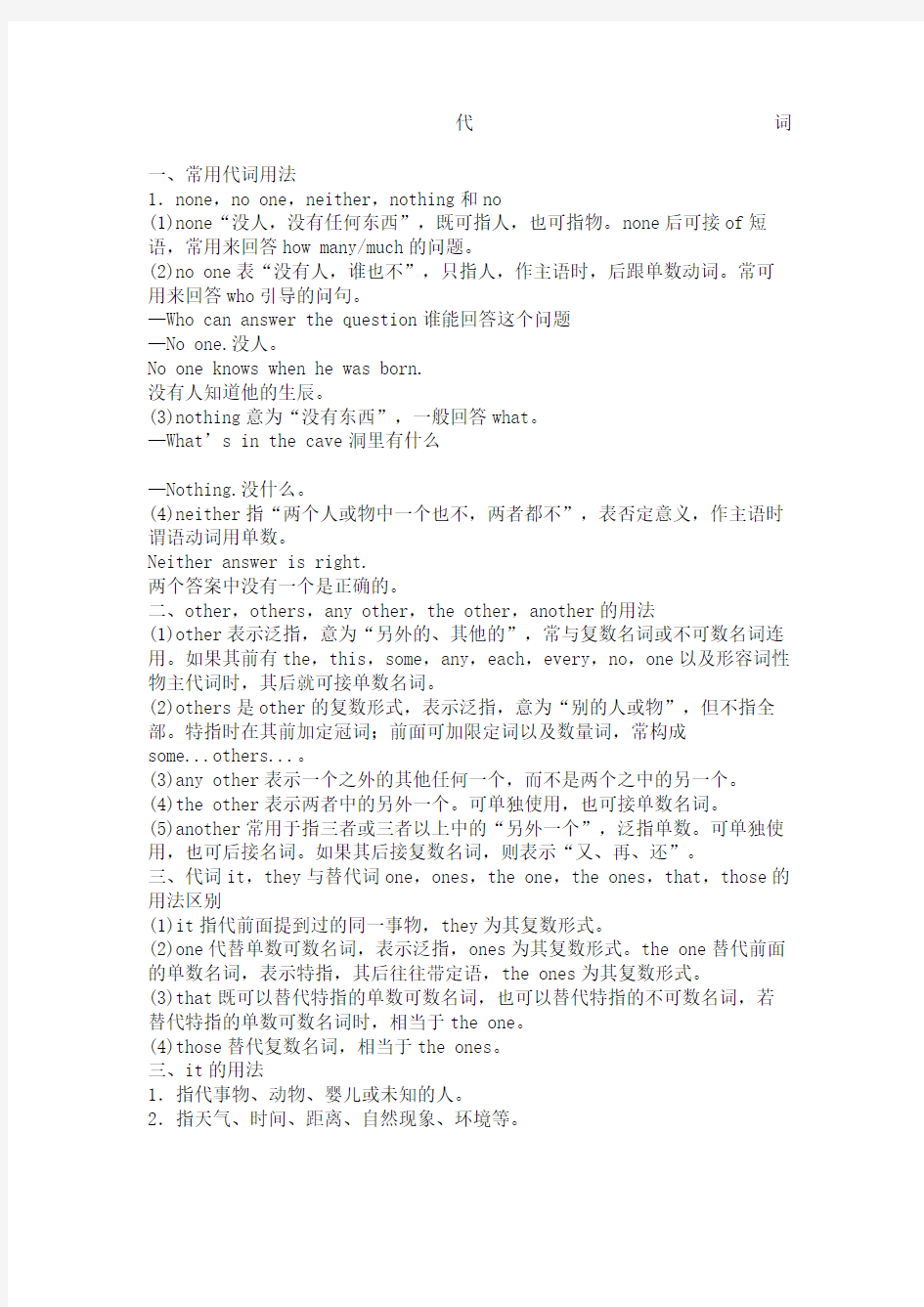

英语资料初中升高中-CAL-FENGHAI.-(YICAI)-Company One1
-CAL-本页仅作为文档封面,使用请直接删除
代词
一、常用代词用法
1.none,no one,neither,nothing和no
(1)none“没人,没有任何东西”,既可指人,也可指物。none后可接of短语,常用来回答how many/much的问题。
(2)no one表“没有人,谁也不”,只指人,作主语时,后跟单数动词。常可用来回答who引导的问句。
—Who can answer the question谁能回答这个问题
—No one.没人。
No one knows when he was born.
没有人知道他的生辰。
(3)nothing意为“没有东西”,一般回答what。
—What’s in the cave洞里有什么
—Nothing.没什么。
(4)neither指“两个人或物中一个也不,两者都不”,表否定意义,作主语时谓语动词用单数。
Neither answer is right.
两个答案中没有一个是正确的。
二、other,others,any other,the other,another的用法
(1)other表示泛指,意为“另外的、其他的”,常与复数名词或不可数名词连用。如果其前有the,this,some,any,each,every,no,one以及形容词性物主代词时,其后就可接单数名词。
(2)others是other的复数形式,表示泛指,意为“别的人或物”,但不指全部。特指时在其前加定冠词;前面可加限定词以及数量词,常构成some...others...。
(3)any other表示一个之外的其他任何一个,而不是两个之中的另一个。
(4)the other表示两者中的另外一个。可单独使用,也可接单数名词。
(5)another常用于指三者或三者以上中的“另外一个”,泛指单数。可单独使用,也可后接名词。如果其后接复数名词,则表示“又、再、还”。
三、代词it,they与替代词one,ones,the one,the ones,that,those的用法区别
(1)it指代前面提到过的同一事物,they为其复数形式。
(2)one代替单数可数名词,表示泛指,ones为其复数形式。the one替代前面的单数名词,表示特指,其后往往带定语,the ones为其复数形式。
(3)that既可以替代特指的单数可数名词,也可以替代特指的不可数名词,若替代特指的单数可数名词时,相当于the one。
(4)those替代复数名词,相当于the ones。
三、it的用法
1.指代事物、动物、婴儿或未知的人。
2.指天气、时间、距离、自然现象、环境等。
3.作先行代词代替不定式、v.-ing形式、名词性从句,作形式主语或形式宾语。
4.用作look,seem,appear,happen等词的主语。
5.表示“喜欢、恨”等心理方面的动词,后面接it,构成固定结构,这类动词有enjoy,prefer,love,like,hate,dislike,appreciate等。
四、代词的特殊用法
1.人称代词单独使用时,一般不用主格而用宾格。
2.与复合不定代词构成的习惯句型。
He is nothing but a clerk.他只是一个职员。
He is anything but a clerk.他绝不是一名职员。
He is someone/something/not anybody.
他是个重要人物/出色的人物/普普通通的人。
3.such指如前所述的这样的人或事物。此时,如果遇到a/an,such必须放在其前;如果遇到no,one,two,three,another,several,some,many,all 等词时,such必须置于其后。有时such之后可以加一个as,用以引出属于哪一类。
4.so作指示代词时,代替一个句子或短语所表达的事情。
(1)在believe,think,expect,suppose,imagine,guess等词后,用so代替前文提出的观点。既可以用于肯定句,也可用于否定句。
(2)用于肯定的hope以及I’m afraid后,代替前文提出的观点。
(3)在肯定句中,表示与上、下文相同的情况。
冠词
一、不定冠词a/an的用法
1.表示“某一个”,译作“一个”。
A Mr.Li is waiting for you.一位李先生在等你。
2.代表一类人或物。
A knife is a tool for cutting with.
刀子是用来切东西的一种工具。
3.不定冠词a(n)用于有形容词修饰的一日三餐前。
Before I go to work every morning,I’ve a light breakfast.
我每天早晨上班前,吃点简单的早餐。
4.不定冠词a(n)用于有形容词修饰的季节、日期前。
We had a very cold winter last year.
去年我们度过了一个寒冷的冬天。
5.“a/an+序数词”不表示排序,表“又一、再一”。
Can you give me a second chance,please(another chance)
再给我一次机会好吗?
6.用于固定词组、短语中。如a few,a little,a number of,all of a sudden,have a swim/walk/talk/dance/look/quarrel,等。
All of a sudden,she burst into tears.
她突然哭起来。
7.抽象名词具体化时,被具体化的名词可能会与a/an连用。
a heavy rain一场大雨
a surprise一件怪事
a pleasure一件乐事
a success/failure一个(件)成功的/失败的人/事
a pressure一种压力/紧迫感
a concern一件令人关切的事
8.不定冠词在一些形容词、副词前后的位置关系。
(1)不定冠词用在副词so,as,too,how加形容词后,修饰名词。
too/as/so/how/however+adj.+a/an+单数名词
(2)用在形容词what,such,many等词后,修饰名词。
what/such/many/quite/rather a/an+单数名词
二、定冠词的用法
1.用在世界上独一无二的人或物、自然现象、表示方位或表示发明物等的名词前。
【注意】有些物体虽然也是独一无二的,但习惯上却不用冠词。
space太空nature自然man人类
2.用在序数词和形容词最高级前面。
Yang Liwei is the first man who has been into space in China.在中国杨利伟是第一个登上太空的人。
3.用在某些形容词、分词前表示一类人/物或用在姓氏复数前表一家人。
The Greens live a happy life.
格林一家人过着幸福的生活。
The wounded were sent to the hospital immediately.受伤者被立刻送往医院。
4.乐器名词前,特别是西洋乐器。
Most people in that village can play the piano.
那个村里大部分人会弹钢琴。
但是中国民族乐器(一般为汉语拼音)和音乐名词前不用冠词。
play Erhu拉二胡play jazz演奏爵士乐
play music奏乐
5.用在表示计量的名词前,如by the hour,by the day等,但是如表示单位的名词为不可数名词,之前不用冠词,如by weight/height等。
I got paid by the hour.我按小时得到报酬。
6.用在the+比较级的句型中。
The more you listen to English,the easier it becomes.
英语你听得越多,它就变得越容易。
7.用在表示某世纪、年代、时期或朝代的名词前。
It is not rare in the 1990s that people in their fifties are going to university for further education.
在二十世纪九十年代五十多岁的人上大学进修不罕见了。
三、零冠词的用法
1.表示季节、月份、星期和节日的名词前和学科、语言、三餐、球类运动、棋类游戏的名词前不用冠词。
I like physics though it’s a bit difficult.
尽管物理有点难,但是我喜欢它。
He is playing chess with his friend on a stone.
他正在一块岩石上与朋友下象棋。
【注意】如果表示季节的名词指具体某年的某个季节,需加定冠词,如in the spring of the year 2009。
2.一人兼多种身份的情况,只在第一个名词前使用冠词,其他名词前不再使用冠词,如a clerk and writer(职员兼作家)。
介词与介词短语
一、表进行意义的四类介词短语
1.at+名词
at work 在办公at play 在玩耍
at lunch 在吃中午饭 at rest 在休息
at table 在吃饭 at school 在上学
at church 在做礼拜 at peace 和平时期
at press 正在排印
2.in+名词
in action 在运转 in progress 在进行
in operation 在运行中
He is in the army.他正在当兵。
He’s been in politics all his life.他一生从政。
3.on+名词
on guard 在值勤on leave 在休假
on holiday 在度假 on strike 在罢工
on sale 在出售 on loan 借贷
on the increase 正在增加
on the go 正在活动,正在奔走
on the march 在行军
on the watch 注意,提防
on the air 正在广播
4.under+名词(名词前有时有冠词修饰)
under development 在发展中
under observation 在观察中
under test 在被测试
under construction 在建设中
under fire 在炮火中
under examination 在检查中
under consideration 在考虑中
under repair 在修理中
Don’t worry.Everything is under control.
别担心,一切都在控制之中。
That has no relation to the matter under discussion.
这和讨论的问题没有关系。
二、原因介词because of, due to, thanks to
because of 因为,由于,通常作状语,位于句首或句尾。
due to由于,因为,通常作表语。
thanks to幸亏,多亏,既可用于褒义,又可用于贬义,多用于句首。
三、for 与of 表示不定式复合结构的逻辑主语
1.It is+adj.+of sb. +to do sth.
=sb.+be+adj.+to do sth.
当形容词说明不定式逻辑主语的性质、特性时,用of。常见的形容词有kind,good,nice,clever, stupid, foolish,considerate, polite, impolite, cruel 等。
2.It is+adj.+for sb.+ to do sth.
当形容词说明不定式的性质时,用for。常见的形容词有important,necessary,possible,impossible等。
四、of+抽象名词=形容词
of+great/much+抽象名词=very+形容词;
of+no+抽象名词=not+形容词。
五、to与情感名词连用,表示“某种行动后产生的感觉
to+one’s+ delight =to the delight of sb.
3.指人体或物体的某一部分。
He seized me by the arm.他抓住了我的胳膊。
4.表示“由于……的结果”的意思。
He succeeded by hard work. 他由于努力工作而成功了。
5.含有“到……的程度”的意思。
This one is shorter than the other by three inches.
这一个比那一个短三英寸。
6.表示买卖东西所按的计算的数或量,或付酬所按的计算的时间。
Milk is sold by the pint, butter by the pound, and eggs by the dozen.牛奶论品脱卖,黄油论磅卖,蛋类论打卖。
7.表示“按照……”或“根据……”的意思。
By my watch,the time is half past eleven.
按我的表,现在是十一点半。
8.表示“因……而得到结果”或“凭着……”的意思。
It was only by chance that I heard the news.
我只是偶然听到了这个消息。
名词
一、名词的数
1.单数名词变为复数名词常考点:
(1)以o结尾的名词变为复数时,常在词尾加-s,但是下列名词要加-es,它们是:黑人英雄爱吃土豆西红柿,即:negroes,heroes,potatoes,tomatoes。
(2)以f或fe结尾的名词变为复数时,一般直接加-s,但下列-f或-fe结尾的名词需把-f或-fe去掉,变为-ves,它们是:为了自己活命,小偷和他的妻子手里拿着刀子和一片树叶站在架子上把狼劈成两半,即:selves,lives,thieves,wives,knives,loaves,leaves,shelves,wolves,halves。(3)合成名词构成复数时,通常只将里面所含的主体名词变为复数,如果没有主体名词,则将最后一个部分变为复数。如:sons-in-law女婿;passers-by过路人;story-tellers讲故事的人;breakfasts早餐;housewives家庭主妇。2.抽象名词具体化
(1)具有某种特性、状态、特点、情感、情绪的人或事,表示变化了的词义时,这一抽象名词可作为可数名词。
difficulty困难;a difficulty一件难事
experience经验;an experience一次经历
failure失败;a failure一个失败者,一件失败的事
knowledge知识;a good knowledge对……精通/熟知
success成功;a success一位成功者,一件成功的事
surprise惊奇;a surprise一件令人吃惊的事
honour荣誉;an honour一位(件)带来荣誉的人或事
Failure is the mother of success.
失败是成功之母。
His new book was a great success.
他的新书获得巨大成功。
(2)有些物质名词有时以复数形式出现,表示不同的类别。
drink 饮料→two drinks 两杯饮料
coffee 咖啡→a coffee 一杯咖啡
ice 冰→two ices两份冰淇淋
tea 茶→two teas两杯茶
Would you like some coffee?
你想喝点咖啡吗?
I would like a coffee and two beers.
我想要一杯咖啡和两杯啤酒。
(3)有些不可数名词变成复数形式可以表示特别的意义。
paper 纸→papers报纸,文件
look 看→looks 外表
condition 状况→conditions 形势,情况
time 时间→times时代
arm 手臂→arms 武器
line 线→lines 台词
manner 态度→manners 礼貌
glass 玻璃→glasses 眼镜
hair 头发→hairs 几根头发
sand 沙子→sands 沙滩,沙地
Don’t judge a man by his looks.
不要以貌取人。
I don’t like his manner.
我不喜欢他的态度。
(4)名词在特殊情况下的复数使用
①有些名词在使用时总是用其复数形式,如:thanks(感谢,谢意),
clothes(衣服,服装),congratulations(祝贺,贺词),goods(货物,商品),works(作品),shoes(鞋子),trousers(裤子),instructions(说明)等。
②有些短语要求用名词复数形式:
make preparations for...为……做准备
take pains to do sth.努力做某事
make both ends meet 收支平衡
keep ties with...同……保持联系
be in high spirits 兴致勃勃
do/make repairs 进行修理
take turns 轮流
二、名词的句法作用
1.作定语
(1)表材料的名词作定语,说明被修饰的名词是什么原料制成的。
stone figures石像gold medal金牌
(2)表地点的名词作定语,说明被修饰的名词存在或发生的地方。
country music乡村音乐post office邮局
school education学校教育
(3)表用途、性质的名词作定语。
coffee cup咖啡杯sports shoes运动鞋
pencil boxes 铅笔盒book marks 书签
(4)man/woman+n.变复数时,作定语的名词和中心词都要变复数。
men teachers 男老师
women engineers 女工程师
2.作宾语补足语
We made him monitor of our class.
我们选他当我们的班长。
【注意】作宾语补足语的名词是表示职位、头衔的词(如monitor,chairman,president,head,king,captain等)时,这类名词前不加冠词。该情况也适用于表语和同位语。
3.作同位语
Mr.Smith,my first teacher,died yesterday.
史密斯先生,我的第一位老师,昨天去世了。
一、几个形容词修饰一个名词时的语序
当同时用几个形容词来修饰一个名词时,一般可按照以下顺序:限定词—描绘性形容词—大小、新旧、式样—颜色—产地(国别)—作定语的名词—被修饰名词。
如:some lovely Chinese children一些可爱的中国儿童(限定词—描绘性形容词—国别)
a small black leather handbag 一个小的黑色皮包(大小—颜色—作定语的名词表示材料)
a small old stone bridge一座老的小石桥 (大小—新旧—作定语的名词)
二、需放在被修饰语之后的形容词形容词作定语,一般放在名词的前面。但如果被修饰语是由some, any, every和no构成的不定代词时,用作定语的形容词必须放在它所修饰的词后面,如:
There is nothing new in his report.
他的报告里没有什么新东西。
Is there anything important有什么重要的事情吗
书本详细
takechargeof (表示动作)
照顾,管理,负责?
他将要掌管这家公司。
He will take charge of the company.
in charge of (表示状态)
照顾,管理,负责
他已经掌管这家公司3年了。
He has been in charge of the company for3 years.
in charge of 控制……(主动)
in the charge of 在……的控制之下(被动)
他负责管理这家公司。
Heisinchargeof this company.
这家公司由他负责管理。Thiscompanyisinthechargeofhim.
marry 结婚, 嫁, 娶
A marry
B A嫁给B (强调动作)
e.g. Mary married a rich Frenchman last year.
marry A to B 把A嫁给B (强调动作)
e.g. He married both his daughters to rich businessmen. adj. married
get / be married 处于结婚状态
e.g. 他已经结婚五年了。
He has been married for five years.
be / get married (强调状态) + to sb. 和……结婚e.g. 她和一位英俊的男孩结婚了。
She was married to a handsome boy.
In pairs discuss what they have in common.
have something in common (with sb./sth.)
(与某人/某物)有共同之处
1. 他们有共同点。
They have something in common.
2. 我跟她有相似的地方。
I have something in common with her.
have nothing in common 毫无共同之处
in a way
从某种程度上说,从某方面说;
有点儿,有几分。
e.g. In a way I like Kate, but I
can’t really trust her.
我有点儿喜欢凯特,但我真的无法信任她。
in the way / in one’s way 挡道,碍事
You are in my way!
你挡着我的道了!
反义词组:out of the way 不碍事
Get out of the way!别挡道!
in any way=anyway/anyhow
无论如何,不管怎样
I must finish the work today in any way.
in no way 决不
他们的惨状一点也没打动他的心。
He was in no way affected by their misery.
注意:置于句首时,句子用部分倒装语序。如:
我们决不向他屈服。
In no way shall we give in to him.
on the/one’s way (to) 在(去……)的路上
on the way to school
on the way home
by the way 顺便提一下
all the way 自始自终; 完全地
in this way 用这种方法
die out 灭亡、绝种、逐渐消失、熄灭
e.g. The dinosaurs died out millions of years ago.
灭亡
e.g. By the time he left the cave, the fire had died out.
熄灭
die from 通常指因环境、事故等外因而死亡;
die of 通常指因疾病、情感、饥寒等而死亡;
1. In big cities during cold winter months, many old people die from the polluted air.
2. The poor woman died of hunger.
辨析:
die out, die away, die off, die down
1. die out:家族、种族灭绝,或习俗、观念等绝迹。
2. die away:声音、风、光等逐渐消失。
3. die off:一群人或动物相继死去。
4. die down:物质特性或情绪逐渐平息。
get / be familiar with…对......熟悉
(人做主语)
e.g. 他通晓中国历史。
He is familiar with Chinese history.
=Chinese history is familiar to him.
be familiar to sb. 为某人所熟悉(物做主语)
e.g. 我对这首歌很熟悉。
This song is very familiar to me.
=I am very familiar with this song.
break up
①破裂, 拆散, 打碎
他父母的关系已经破裂了。
Their parents have broken up.
②驱散
警察驱散了人群。
The police broke up the crowd.
③停止, 结束
e.g. 放学了。
The class has broken up.
be confident of/about/in…对……有信心
e.g. Don’t be too confident in your
own opinion.
Tom is confident of his ability to
overcome the difficulty.
have confidence in…
对……有信心
be sensitive to... 对……敏感/过敏
e.g.
1. 他对批评很敏感。
He is very sensitive to criticism.
2. 她对粉尘过敏。
She is sensitive to dust.
above all: 首先;最重要的是
最重要的是,你要相信自己。
Above all, you should believe yourself.
词组拓展:
after all 毕竟
not at all 一点也不
in all 总共,合计
There were twenty in all at the meeting.
会上共有二十个人。
in memory of 为了纪念为了歌颂 in praise of
e.g. 这家博物馆是为了纪念这位着名的为了纪念 in honor of
科学家而建的。为了庆祝 in celebration of
The museum was built in memory of 为了寻找 in search of
the famous scientist.
be tired out 筋疲力尽
当我最终到达山顶的时候我筋疲力尽了。
I was tired out when I finally reached the top of the mountain.
be tired from 因……而疲倦
我由于跑得太快而感到很累。
I was very tired from running fast.
get away with (doing) sth.
1)不因某事受惩罚
我不会容忍你考试作弊而不受处罚。、
I won’t have you getting away with
cheating in the exam.
2)偷携某物潜逃
这些盗贼携巨款潜逃。
The robbers got away with a lot of money.
【拓展】与get 相关的短语
get across 越过; 通过; 被理解
get in touch with sb 与某人联系
get rid of 除掉; 摆脱; 处理掉
get together 相聚
no more...than & not more...than
no more...than...
和……一样不(两者都否定)
not more...than 不如……
(前者不如后者)
小李不勤奋,约翰也不勤奋。
Xiao Li is no more diligent than John.
小李不如约翰勤奋。
Xiao Li is not more diligent than John.
She didn’t look happy but glared at him.
她双眼直瞪着他, 看上去很不高兴。
glare at sb. 怒视某人
stare at sb. (因好奇、无礼等)
盯着某人看
e.g. 他好奇地盯着我看。
He stared at me curiously.
1) agree with sb.
表示同意某人、同意某人的话或观点,含有
赞赏地、肯定地对待某事之意。
2) agree on / about sth.
达成协议;意见一致
3) agree to sth. 同意某事或某项建议,
后面只能接表示“提议, 计划, 方案”
的名词。
e.g. 我赞同他们的建议。
I agree to their suggestion.
In this way they cut down the fat and increased the fibre in the meal.这样,他们减少了饭菜中的脂肪含量,
增加了纤维素。
1) cut down 砍倒;削减
他为保持健康少喝咖啡,少抽烟。
He cut down on coffee and cigarettes to keephealthy.
2) cut into 切成
蔬菜应切成小碎块。
Vegetables should be cut into small pieces.
3) cut up 切碎
妈妈正剁肉准备包饺子。
Mom is cutting up the meat to make
dumplings.
4) cut off 切断; 停掉
我们的供水再次中断。
Our water supply has been cut off again.
辨析: before long, long before
1)before long 意为“不久以后”,相当于
soon,可与一般过去时和一般将来时连用。
我盼望不久以后就能见到你。
I hope to see you before long.
2) long before 意为“很久以前”或“在……之
前很久”。
马克上学之前很早就学会了看书。
Mark learned to read long before he started
school.
…the earth may become too hot to live on.
地球可能会因此变得太热而不适合生物的生存。
有关too的一些用法:
1) too作“太”讲。
This shirt is too large for me.
这衬衫我穿起来太大。
2) “too+adj.+to”“太……而不能……”
问题太难,理解不了。
The question is too hard to understand.
3) “only/all/not/but+too+adj.+to”,
后面的动词不定式在翻译时不必加否定词,
意为“非常”。
我非常欢迎你再来信。
I shall be only too pleased to hear from you
further.
他们非常喜欢这么做。
They are but too glad to do so.
4) “can not/never…too…”,表示“无论怎样……也不会过分”。你无论怎样表扬他也不过分。
You cannot praise him too highly.
你越注意健康越好。
You can never be too careful of your health.